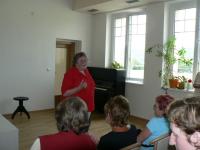I acknowledge two sets of commandments, the Scout commandments and God’s commandments.
Anna Hojerová, Scout name Akela, was born in 1933 in Horní Mokropsy into the family of the local mayor. She spent her childhood and years of youth in her home village and the rest of her life nearby, in Všenory. In 1946 she joined the newly formed Girl Guide troop, gradually becoming Patrol Leader and taking part in the preparation of activities. However, under Communist totalitarian rule, the Scout Movement was banned. Her family was persecuted under the Communist regime, her husband Miloš “Logan” Hojer’s mother was even convicted of high treason in one contrived trial. During the Prague Spring, Anna Hojerová took an active part in the renewal of Scouting in her area. At the time, she did her part among other things such as lead the younger Scouts, the Cubs. She continued her activity in Scouting after the movement was renewed again after the Velvet Revolution. She remains very active, whether in the Scout Movement or in civic life.
